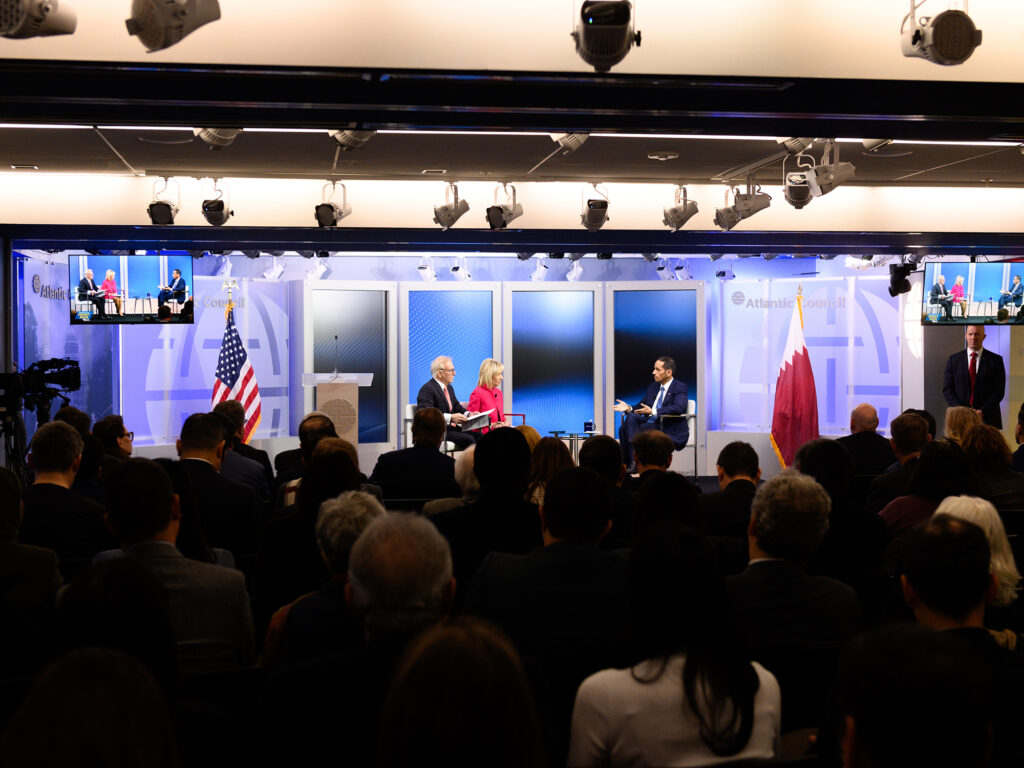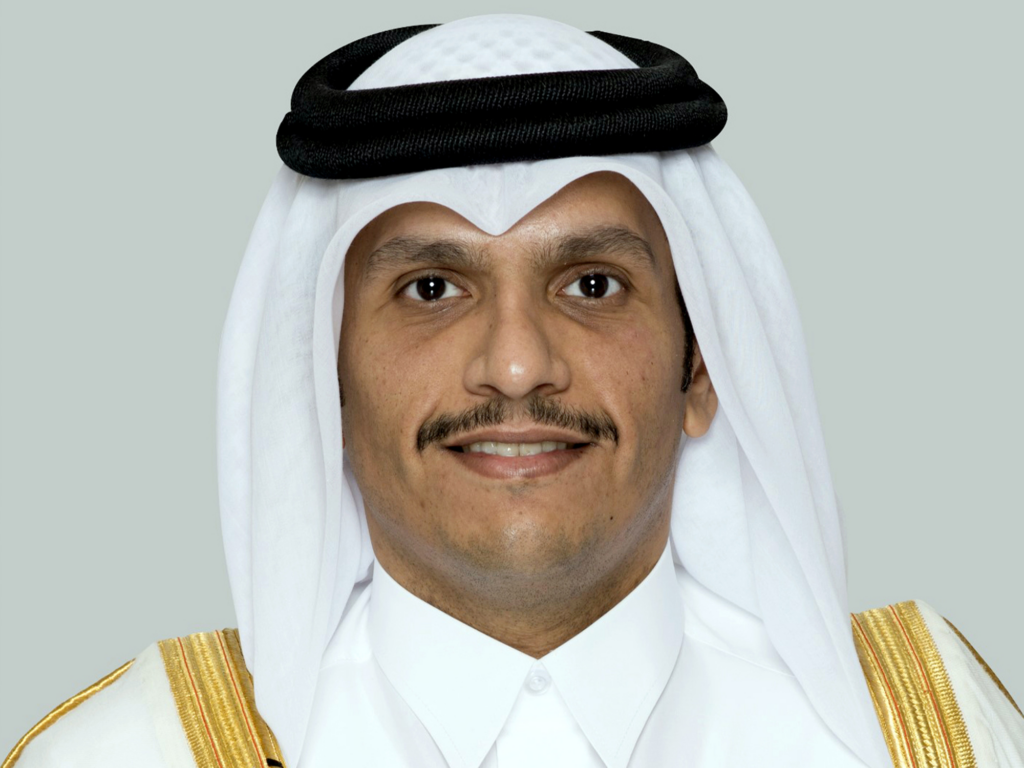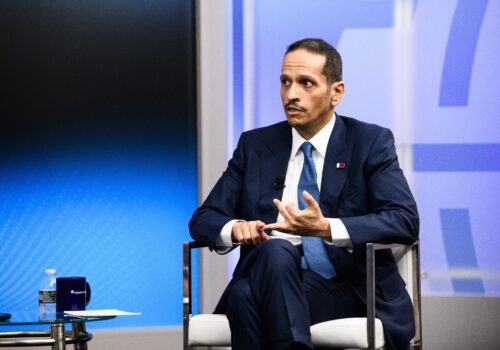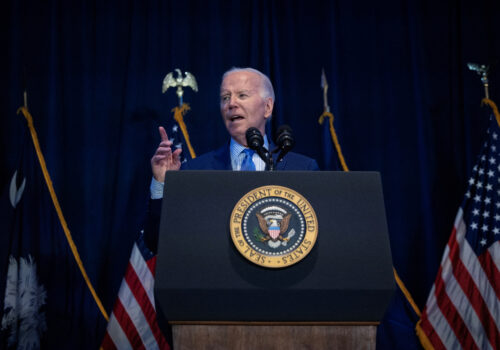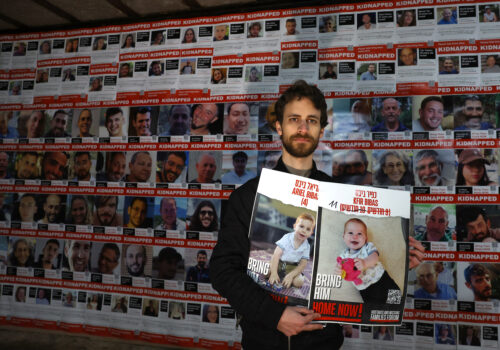Watch the event
According to Qatar’s prime minister, Doha has been warning “from day one” that the Israel-Hamas war could spiral across the Middle East. And now—one day after an Iran-backed militant group launched a drone attack that killed three US servicemembers in Jordan— “we are seeing that the situation is boiling up here and there, and everyone, unfortunately, is dancing at the edge,” warned Prime Minister Sheikh Mohammed bin Abdulrahman bin Jassim Al-Thani.
He spoke Monday at an Atlantic Council Front Page event hosted by the Atlantic Council’s Scowcroft Middle East Security Initiative, taking questions from NBC News’s Andrea Mitchell and the Washington Post’s David Ignatius.
There, in front of a live audience that included families of people currently held hostage by Hamas, Al-Thani also discussed talks that took place in Paris over the weekend among negotiators from Egypt, Israel, Qatar, and the United States. According to the Qatari prime minister (who also serves as the country’s foreign minister), the negotiators drafted a framework for a new hostage deal, which he called “good progress” on mapping a way out of the conflict. The deal would include three phases, with one phase to include Hamas hostage releases in exchange for Palestinian prisoners in Israel, in addition to pauses in fighting.
Now, the negotiators are looking to Hamas’s formal response—though the group indicated Monday night that it may reject the deal—and to engage the group “positively and constructively in the process,” he said. “That will be the only way to get the situation de-escalated.”
Below are more highlights from the event, which delved into the tensions across the Middle East and Qatar’s mediator role.
Qatar as mediator
- The Qatari prime minister said that the parties to the conflict and in negotiations have made “progress” recently and are in a “much better place” than they were a few weeks ago. He added that the progress made “might lead to a ceasefire permanently in the future.”
- In condemning the drone attack in Jordan, for which Washington vowed to retaliate, Al-Thani said that he hoped that any retaliation wouldn’t “jeopardize the process” of negotiations, although he added that he thinks “it will definitely have an impact… on the regional security.”
- Qatar, Al-Thani explained, has been in “continuous conversation” with Iran about everything unfolding across the region. He said Doha tells Tehran that it should use its relationship with actors across the region “to de-escalate” tensions, including in the Red Sea, where Houthi rebels are attacking vessels and disrupting trade.
- The prime minister said that the framework coming out of Paris is based on proposals from both Israel and Hamas, and that bridging “the gaps” between parties to the conflict is Qatar’s main role as mediator.
- When asked whether Qatar would use any sort of leverage to pressure Hamas to accept the deal, the prime minister said that Qatar plans to simply use its words and proposals for solutions; “beyond this leverage,” he said, “we don’t see that Qatar is a superpower that can impose something” on Hamas or Israel to get them to agree.
‘Unprecedented’ suffering
- The United Nations Relief and Works Agency for Palestine Refugees in the Near East (UNRWA) recently fired several employees after Israel aired allegations that UNRWA staff members had participated in Hamas’s October 7 terrorist attack. This led multiple Western countries (including the United States, a major contributor) to cut funding to the agency.
- “It’s the only agency that can provide help and aid for the Palestinians,” Al-Thani warned. “These claims [need] to be investigated,” he added, “but [UNRWA] cannot be punished because of the [acts] of some employees.”
- When asked whether Israel agreed in Paris to accelerate aid deliveries, the prime minister cautioned that humanitarian aid shouldn’t be used as a “bargaining chip” in negotiations. “People in Gaza are dying from starvation,” he said, adding that Gazans have nowhere to go, as even in safe zones, they are being bombed. What they are going through “is something unprecedented,” he argued.
The ‘only way forward’ for peace
- Al-Thani cautioned that, even when the Israel-Hamas war ends, if the region returns to its “previous status”—in which the West Bank and Gaza still have no hope for political resolution and the security of the region continues to be determined by “political dynamics” that pop up unpredictably—“then we are going to be in [a] much worse situation.”
- “The only way forward for us to have a peaceful region is the two-state solution,” the prime minister argued.
- Yet, Hamas has sought Israel’s destruction, and Israeli Prime Minister Benjamin Netanyahu has refused to accept a two-state solution. When asked about those seemingly irreconcilable views, Al-Thani said that the two-state solution will require like-minded partners on either side and that “whoever is accepting this principle” will be dealt with in a “very positive manner.”
- The prime minister added that any peace plan should include security guarantees designed so that neither state will present a threat to the other. “We don’t want to see any country able to launch a war against its neighbor,” he said.
- “If we can put an end [to] this conflict that’s been lasting for decades, the entire face of the region will change,” Al-Thani said.
Katherine Walla is an associate director of editorial at the Atlantic Council.
Watch the full event
Further reading
Mon, Jan 29, 2024
Qatar’s prime minister on Israel-Hamas hostage negotiations and the prospects for a two-state solution
Transcript By
At an Atlantic Council Front Page event, Al Thani discussed his country's role in mediating Israel-Hamas hostage negotiations.
Sun, Jan 28, 2024
Experts react: Three US servicemembers were killed in Jordan. Will the US strike back at Iran?
New Atlanticist By
More than 150 attacks on US forces in the Middle East have occurred since October 2023, but the strike overnight was the first to kill a US soldier.
Wed, Jan 17, 2024
Hamas hostage-taking must not go unpunished. The ICC must make a case against the terrorist group.
MENASource By
If Hamas hostage-taking is left unaddressed and its victims go without redress, international norms will be severely eroded.
Image: The Qatari prime minister speaks at an Atlantic Council Front Page event on January 29, 2024. Photography by Clarissa Villondo.
